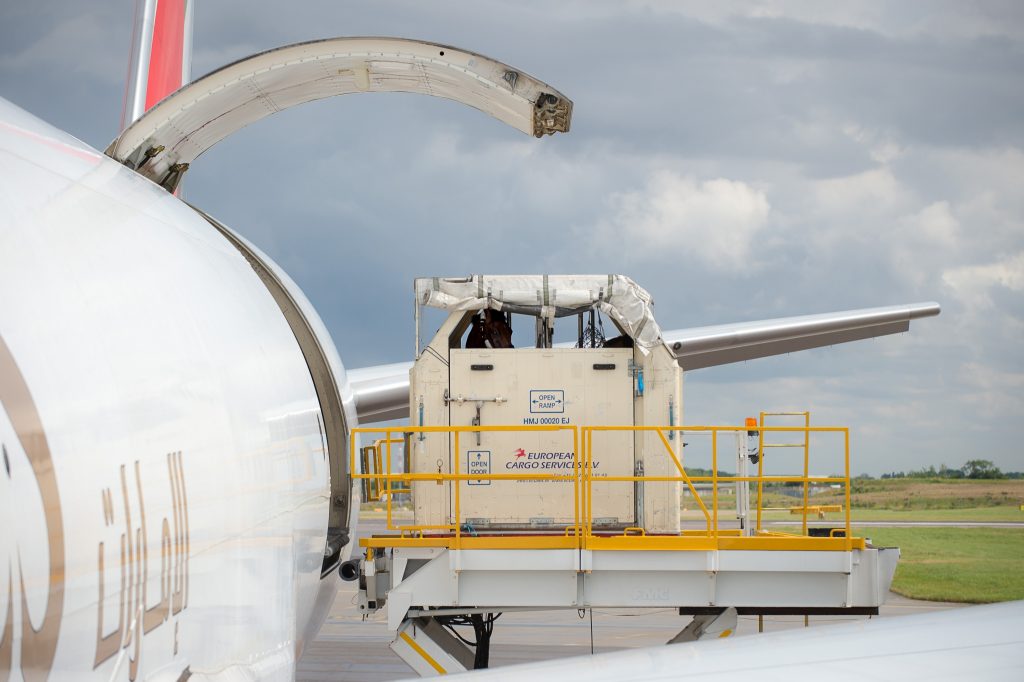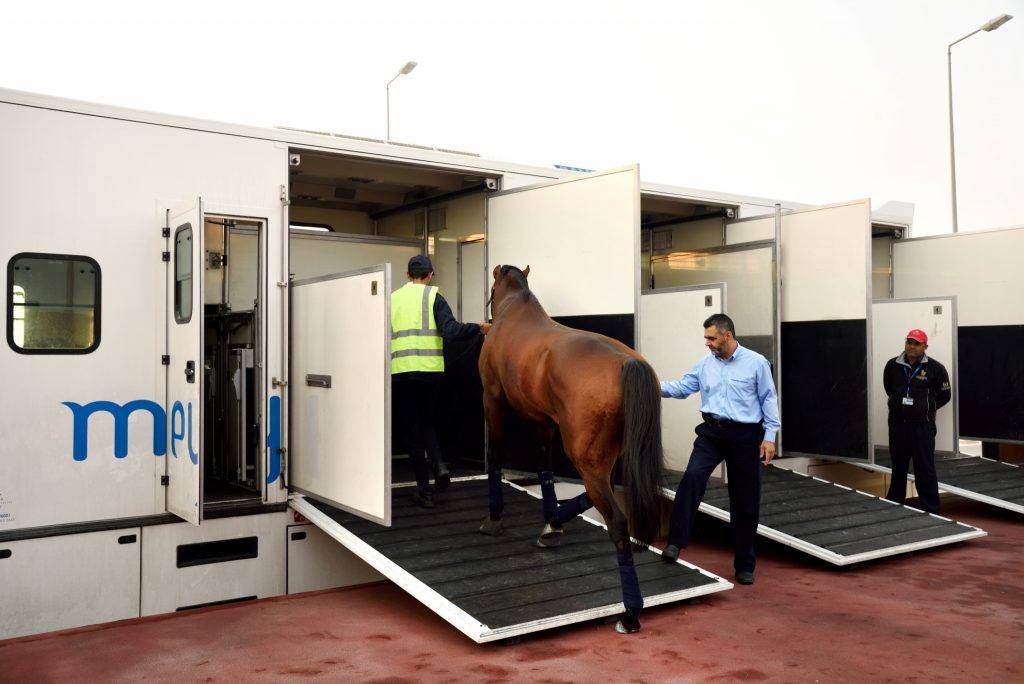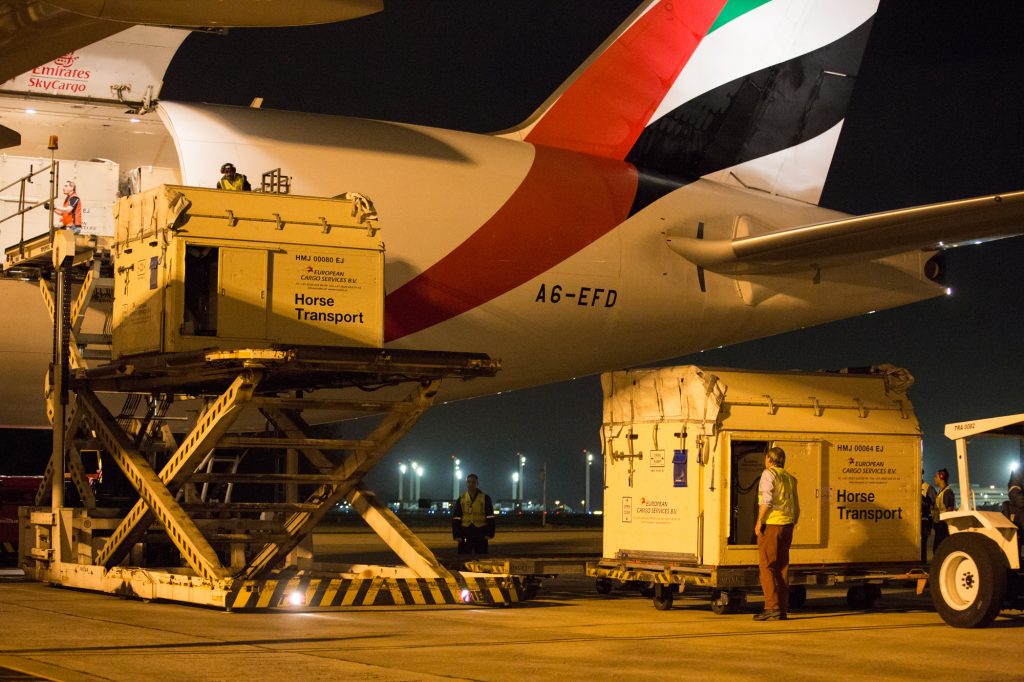Horseracing is one of the heritage sports of Dubai. Dubai World Cup, a Thoroughbred horse race, has been held annually on the last Saturday of March, since 1996. Conducted by the Emirates Racing Authority, it was first held at the Nad Al Sheba Racecourse, and since 2010, at the iconic Meydan Grandstand and Racecourse. Winners can boast of a prize money of $10mn, and tens of thousands of people descend upon the city every year to bask in the magnitude of this event. Dubai World Cups first winner was Thoroughbred Cigar (named after a navigational intersection for airplanes), owned by Allen E. Paulson.
The race itself falls under the banner of the Dubai World Cup Night, which includes seven other Thoroughbred races, and one Purebred Arabian race.
Thoroughbred, breed of horse developed in England for racing and jumping. The origin of the Thoroughbred may be traced back to records indicating that a stock of Arab and Barb horses was introduced into England as early as the 3rd century. Natural conditions favoured development of the original stock, and selective breeding was encouraged by those interested in racing.
Thoroughbreds have delicate heads, slim bodies, broad chests, and short backs. Their short leg bones allow a long, easy stride. They are sensitive and high-spirited.
The term thoroughbred is sometimes incorrectly used to mean purebred, but Thoroughbreds are a specific breed, registered in the General Stud Book of the English Jockey Club, organised about 1750, or in the studbooks of similar clubs in other countries. via Britannica.com
Undeniably, transporting the horses for the races is one of the biggest challenges. Complete care has to be ensured during the course of a journey, and the horses travel in utmost luxury, inside a stable that includes bedding, hay, and plenty of water. Horses have very fragile legs and greatest care must be taken not to harm them when the animals are walked into the stall. Grooms make sure the horses are constantly fed and hydrated; they are the stars of the event.
Emirates SkyCargo, the freight division of Emirates airline, has been transporting some of the worlds best racehorses to Dubai for the global racing event.
Emirates SkyCargo is no stranger to transporting horses, says Hiran Perera, Emirates senior vice president, cargo planning & freighters. We have been engaged in equine transport from 2002 onwards. Right from the process of boarding, we ensure that the welfare of the horses is kept in mind.
In 2017, the freighter transported Arrogate, the worlds highest rated racehorse at the time. Arrogate was joined by stable companion Hoppertunity, another contender for the Dubai World Cup, for the journey from United States to Dubai. The carrier worked with the international equine transport specialist Janah Management Company, who also provided highly specialised grooms to accompany the horses, to ensure successful and safe transportation.
Emirates SkyCargo transports all breeds of horses– racing horses as well as horses for endurance races and other major equestrian events such as show jumping and dressage, explains Perera. Because of our reach and network, we transport horses all over the world not just the Dubai World Cup but a number of major equestrian events around the world. Last year we transported over 100 horses across three continents for the Longines Global Champions Tour. We had to operate 10 dedicated freighter flights with around 25 horse stalls per flight to make this happen.
Did you know? Each equine passenger has an allocated baggage allowance, by weight however this includes the horse itself! Plus water, hay, 30kg shavings as bedding, water buckets, feed buckets, tack bags (for saddles and bridles), rugs and any spare equipment. Horses are also provided with in-flight wear, such as a light rug and protective leg gear. More so, every horse has his passport, and is microchipped. Via Fédération Equestre Internationale (FEI)
In June 2017, Emirates SkyCargo successfully transported some of the worlds best show jumping horses across three continents in the space of a month. The horses were transported from Liege in Belgium to compete in the first three legs of the Longines Global Champions Tour in Mexico City, Miami, and Shanghai in April 2017. Emirates SkyCargo worked closely with Peden Bloodstock, a specialist in horse transportation to manage the complex logistics involved in flying close to 100 horses across four different countries within the space of a few weeks.
Emirates SkyCargo transported 93 horses in two flights from Liege to Mexico City for the first segment of the journey between 31 March and 1 April 2017. The horses, each weighing between 600-650 kgs, were transported in Emirates SkyCargo Boeing 777F freighters along with 11 accompanying grooms and about 30 tonnes of equipment. The flights lasted close to 12 hours and the horses arrived at their destination a few days ahead of the start of the championships. Incidentally, all the winners of the CSI 5 level competitions* at the Longines Global Champions Tour event in Mexico City had travelled on board Emirates SkyCargo.
The second leg of the tour involved a relatively shorter three hour hop for the 93 horses from Mexico City to Miami onboard Emirates SkyCargo freighters. At the close of the event in Miami, the horses were brought back to Liege on 16 April 2017.
*CSI 5 is the highest international level for show jumping as designated by the International Equestrian Federation (FEI), the international governing body for all equestrian disciplines.
For the next stop in the itinerary, the air cargo carrier transported 96 horses and 27 grooms in three separate flights from Liege to Shanghai on 22 and 23 April 2017, and back on 1st and 2nd May 2017. The jet-setting horses had approximately one week on the ground at each destination to compete in tournaments before being transported to the next stop on their itinerary.
Emirates SkyCargos freighter hub at Dubai World Central airport includes dedicated areas for handling and airside ramps for horses, one of the very few global locations that hosts a permanent dedicated horse ramp. The carrier also provides custom designed horse stalls and trained and experienced expert personnel to ensure proper handling and welfare of the horses. Inside the cargo hold of the aircraft, the temperature is set to ensure maximum comfort and minimum stress for the horses. Premium horses can also travel with professional grooms and certified veterinarians onboard Emirates SkyCargo freighters.
Our dedicated horse ramp at DWC ensures that the process of boarding is safe and stress free for the horses, from their transport vehicle to the horse stalls in the aircraft and vice versa, remarks Perera. Once inside the aircraft, the interiors are maintained at a temperature that is comfortable for the horses. With our modern fleet of Boeing 777 freighter aircraft, we are able to make sure that the horses travel comfortably. We also allow for professionally trained and experienced horse grooms and vets to travel with the horses at the owner/ shippers request. This allows for constant attention and monitoring of the horses welfare even during the flight.
Perera mentions that the horses tend to arrive anywhere between two to three months prior to the event to even just a few days before the main race. It is a decision that is made by the stables that own the horses.
He says: We ensure that all international regulations relating to the transport of live animals such as the IATA Live Animals Regulation (LAR) are followed to enable safe and secure transportation of horses. What we keep in mind when we are transporting horses is that the comfort and safety of the horses is of primary importance. We need to make sure that the horses are not fatigued because of the journey and arrive after a comfortable and quick journey ready to hit the ground running. Emirates SkyCargo also helps move the horses back home post the races, and transports personal horses for individual customers.
Janah Management Company is a worldwide equine transportation company, formerly known as Darley Transport. Based in Dalham Hall Stud, Janah transports over 5000 horses per year to destinations all over the globe making them one of the largest equine shippers in the world. Janah is the equine logistics department for the Maktoum family.
Darley is HH Sheikh Mohammed bin Rashid Al Maktoums global thoroughbred stallion operation which currently stands stallions in six countries around the world. Sheikh Mohammed purchased the headquarters Dalham Hall Stud in 1981.
Godolphin is the Maktoum familys private Thoroughbred horseracing stable, named after the Godolphin Arabian, one of the three founding stallions of the modern Throroughbred. Headquartered in Dubai and established in 1992, the operations are directly overlooked by HH Sheikh Mohammed bin Rashid Al Maktoum. Godolphin has won over 4,500 races worldwide, with horses trained in Dubai, United Kingdom, Australia, America, Ireland, and France. Some of the best horses in the world wear the stables famous royal blue silks.
Sheikh Mohammed was honoured by the racing industry in 2008 when he was presented with the Cartier Award of Merit for his outstanding contribution to the thoroughbred industry.
2016 saw the global racing and breeding empires of Sheikh Mohammed, Darley and Godolphin, merge into one seamless operation. Darley, under which all Sheikh Mohammeds bloodstock holdings formerly operated, is now used solely as a brand to promote stallions.
Henry Bullen, shipping director, Janah Management Company, comments: Travelling any live animal is a challenge as there are so many variables that must be taken into consideration. The horses travelling for the Dubai World Cup are all elite athletes and it is vital, as with all horses, that they are transported as swiftly and smoothly as possible on the shortest route. There are limited aircraft that can carry horses and the schedules do not always meet our requirements, so we work closely with the airlines to charter aircraft and adjust schedules to ensure the smoothest journey for the horses.
Bullen explains that laws pertaining to animal transport differ greatly from country to country and region to region; things can be as simple as filing a halth certificate, or as complex as months of quarantine and various blood and vaccination requirements.

Horses must meet strict import health requirements for entry into the UAE, says Bullen. Prior to shipment, the horses are vaccinated for equine influenza and are tested for a number of equine diseases. They are monitored by vets prior to export to ensure that they are fit and healthy.
Within 48 hours of shipment, a vet will inspect them and complete an export health certificate which has been agreed between the country of origin and the UAE; this must travel with the horses. Upon arrival in the UAE, the horses are quarantined and monitored by vets and the quarantine team.
IATA’s Live Animals Regulations (LAR) is the worldwide standard for transporting live animals by commercial airlines. Whether it is a pet, an animal transported for zoological or agricultural purposes, or for any other reason, the objective of the LAR is to ensure all animals are transported safely and humanely by air. The 42nd edition of the regulations came into effect on 1 January 2016.
For horses in particular, IATA has rules and procedures, pertaining to:
– Container requirements, stall configurations, and ventilation
-Qualified attendants, with skills to administer tranquilisers or perform euthanasia
-Transporting mares and foals together or in close proximity
-Protection of legs, as they are highly sensitive
-Adequate feeding and watering; avoid tidbits
-Ensuring that the horses are transported facing forwards or backwards to the direction of flight
